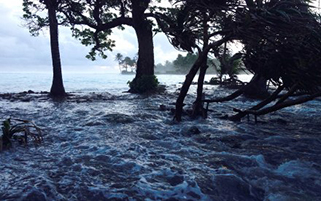Cultural rights in global crises
Special Rapporteur in the field of cultural rights
In recent years, intertwined global economic, climate and health crises have made obvious the extend to which all humans, whatever the country they live in, are closely related to each other and may be highly affected by the choices and policies that are implemented beyond their borders.
As culture – values, knowledge, beliefs, ways of life – mediate all individual and collective responses to the challenges societies face, it cannot be comprehended purely in sectoral terms, separated from other sectors. Cultural rights are fundamentally relevant to every dimension of the global crisis. On the one hand, some cultural resources and conditions for the exercise of cultural rights for all are threatened by the impacts of the crises. On the other hand, the diversity of cultural resources and the free exercise of cultural rights and freedoms offer avenues to better respond to these crises, both globally and locally, displaying both universality, in the form of a concerted global response, but also diversity, in terms of addressing specific impacts, actors and opportunities.
Below, you will find the thematic work conducted by the mandate on some aspects of the global crisis, on the impact policies and practices implemented have had on cultural resources and cultural rights and on the potential the exercise of cultural rights represent in search for sustainable, acceptable and adapted responses. The page also includes developments in other parts of the UN system and important links.
Reports
Climate change, culture and cultural rights (2020)

A high tide energized by storm surges washes across Ejit Island in Majuro Atoll, Marshall Islands, causing widespread flooding and damaging a number of homes. Climate change is a major concern for Pacific island states such as the Marshals, Kiribati and Tuvalu, where many atolls are barely a metre (three feet) above sea level and risk being engulfed by rising waters.© GIFF JOHNSON/AFP/Getty Images
For her 2020 thematic report to the General Assembly, the Special Rapporteur addressed the cultural and cultural rights dimensions of the current climate emergency (A/75/298)
Key Findings and Recommendations
In the report, the Special Rapporteur examines the negative impact of climate change on culture, cultural heritage and cultural rights. Measures to catalogue the harmful effects of climate change are discussed, and States are urged to participate in these measures. The expert addresses the limitations of current mitigation and adaptation measures and urges a human-rights-based approach that respects the cultural rights of affected people.
She also considers examples of how cultural practices can be used to share information and to combat the effects of climate change, including through greater use of traditional knowledge. The report also includes recommendations to States, civil society and other stakeholders.
In the annex to the report, the Special Rapporteur discusses the legal framework surrounding cultural rights and climate change, as well as climate change denial and the right to scientific knowledge.
Read the report on climate change, culture and cultural rights and its annex.
In order to better assess threats posed by climate change to culture and all of the cultural rights covered by her mandate, the Special Rapporteur prepared a questionnaire, which she sent out on 30 March 2020. See the questionnaire and the responses received
The impact of the COVID-19 pandemic on cultures and cultural rights (2021)
In her 2021 report to the Human Rights Council, the Special Rapporteur focused on the impact of the coronavirus (COVID-19) pandemic on cultures and cultural rights (A/HRC/46/34), and the potential global cultural catastrophe it represents, with severe, long-lasting consequences for cultural rights and other human rights.
Key Findings and Recommendations

© Engin Akyurt, Man With Face Mask Using Laptop In The Dark, March 2020.
In the report, the Special Rapporteur surveys the negative impacts of COVID-19 on cultures and cultural rights worldwide, and the positive potential of cultures and cultural rights, including the right to science, to enhance rights-respecting solutions and build resilience.
One of the aspect the Special Rapporteur addressed in her study is how measures taken to respond to the pandemic and prevent the spread of the virus have impacted the cultural sectors and those who work in them. She highlighted the paradox that at the moment when the enjoyment of cultural resources and the meanings of cultural expressions were increasing valued as coping mechanism, means of building resilience, overcoming isolationand and developing the capacities to imagine the future, those who produce arts and culture were finding their work increasingly difficult.
The Special Rapporteu also consider the important role of the right to benefit from scientific progress and its applications in addressing the pandemic. She raises concerns about the extent to which bureaucratic, political and economic concerns have been allowed to interfere with, impede or delay the process of applying science and public-health expertise to policymaking, how the denial or downplay of scientific knowledge and methods have increased the threats and casualties, and the fact that some scientists have been prevented from speaking freely, threatened and attacked for their efforts in trying to inform about the virus.
The expert make a number of recommendations aiming at strengthening the cultural and scientific sectors – institutionally and financially – during and after the pandemic and at improving the security and working conditions of those working it them, who are key for everyone's exercise of cultural rights. She recalled the need for solidarity to guarantee cultural rights and the right to science, nationally and internationally, in the face of the COVID-19 pandemic.
See the report on the impact of the COVID19 pandemic on cultures and cultural rights
In order to identify main challenges posed by the COVID-19 pandemic on the enjoyment of human rights and inform their respective reports, several Special Procedure mandate holders including the Special Rapporteur in the field of cultural rights, prepared a joint questionnaire which was disseminated in May 2020. See the letter and questionnaire, and consult the responses received to the full questionnaire and to the section dedicated to cultural rights.
Related events and materials
- Side-event "Safeguarding the rights to freedom of religion or belief and cultural rights at a time of crisis" during the UN General Assembly, 22 October 2020.
Climate change
- Launch of the Climate Heritage Network Race to Resilience Campaign, organized during COP26, 2 November 2021
- Webinar "Climate change and cultural extinction: A Human Rights Crisis" organized with Roosevelt House Public Policy Institute at Hunter College during the UN General Assembly, 21 October 2020
- "A Human Rights Approach to the Intersection of Climate Change and Cultural Heritage", intervention at the Climate Heritage Mobilization San Francisco, USA, 12- 13 September 2018
COVID-19 pandemic
- Contribution on Preventing Cultural Catastrophe in the Pandemic: A Cultural Rights Approach, at the Fifth Annual Lecture of the Human Rights Centre, University of Essex, 8 July 2021
- Webinar: Preventing “cultural catastrophe” in the pandemic: a cultural rights approach, organized by Artists at Risk Connection, 9 March 2021.
- Webinar: Human rights, art and protest: voice and expression in U.S. minority communities in the time of the pandemic, organised jointly by the UN Human Rights Office (OHCHR) and Freemuse, 11 February 2021.
- Closing remarks of the Special Rapporteur for the International Congress on Cultural and Creative Industries, organized by the Ministry of Culture of the Government of the State of Jalisco (Haleesco), Mexico, on "Cultural rights in the face of the covid crisis", 28-30 October 2020.
- "Culture is the heart of our response to COVID-19", in the panel session on "Accelerating transformation from the ground up in the post COVID-19 era", in the framework of the Local and regional governments' day of the High Level Political Forum on Sustainable Development, 10 July 2020
- Video of the concluding interventions (K. Bennoune as of 6.32)
- Programme of the online event
- Intervention by the Special Rapporteur in the round table "Imagine the tomorrow", thematic session on "The cultural mobilization in the COVID-19 pandemic", organised in the framework of the Live Learning Experience: Beyond the Immediate Response to the Outbreak by UCLG, UN Habitat and metropolis, 22 April 2020
Other documents of the Special Rapporteur
See the thematic page of the mandate dedicated to cultural rights in development and sustainable development.
Useful links
- Committee on Economic, Social and Cultural Rights
- OHCHR resource page on climate change
- Climate heritage network
- Special Procedures resources on COVID-19
- OHCHR /UNEP: Key messages on human rights, the environment and COVID-19
- United Cities and Local Governments, Committee on culture